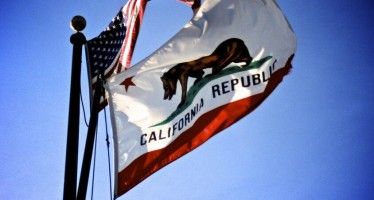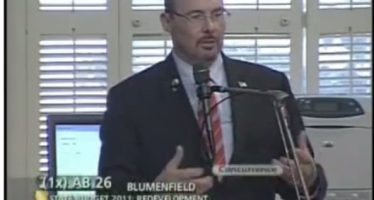Blakeslee Plans For Tax Law Reforms
FEB. 8, 2011
By KATY GRIMES
During the gubernatorial campaign, job creation and retention was a prominent theme in candidate Jerry Brown’s speeches. And now as governor, his recent State of the State address also included the job theme. Since being elected in November, Brown has been pushing for creating green-energy and manufacturing jobs, investing in education and infrastructure, and improving job-training programs. But Brown is also calling for the extension of $14 billion in taxes, leading many to wonder how extending tax increases can help the state’s job creators.
California legislators spent much of the past year talking about the need to improve job-creating conditions, but with very different approaches, most preferring short-term “fixes” on budget problems, through tax and fee increases.
A recent analysis by the Tax Foundation of changes to state tax law in 2010 shows that of the states in the U. S. that raised taxes, the fixes were usually focused at specific groups, rather than enacting broad-based reforms. And the Tax Foundation analysis questioned Brown’s promise to pursue a ballot initiative in June that would increase the “temporary” taxes.
Last week Sen. Sam Blakeslee, R-San Luis Obispo, chairman of the Recovery, Reform and Realignment Senate Select Committee, held the first hearing of 2011 on tax reform strategies, with the goal of permanently reducing volatile state revenues, to help make California a competitive job creator again.
Not satisfied with the annual temporary budget fixes, Blakeslee, has taken up tax reform as his big project for 2011. “One purpose of the committee is to formally address the debate around Governor Brown’s temporary tax extension proposal. The bi-partisan Committee hearing on tax reform strategies was about how to reduce the volatility of state revenues and make California a more competitive job creator,” Blakeslee said.
And while it’s no small task, Blakeslee says that tax reform could be relatively simple since the taxing structure in California is not all bad – just in need of some realistic adjustments. “Every crisis we say we don’t have time to fix taxes, and tax reform is forgotten until the next crisis,” Blakeslee said after the hearing. “But this is what we are paid to do – we don’t have the luxury not to pay attention.”
Blakeslee invited two tax experts and California’s Legislative Analyst, Mac Taylor, to testify at the hearing about what reforms would be most effective for California, what to do about California’s highest marginal tax rate in the country, challenges to the tax bases, and volatility and compliance problems.
“California didn’t manage the boom well,” Taylor said, explaining the boom-and-bust impact of California’s volatile tax revenue. During the prosperous times, California saved nothing for the future.
Taylor voiced concerns about taxing the service sector of the economy, questioning what services to tax and where to draw the line. “Our tax system is decent, but there are ways to make changes to lower rates,” added Taylor.
Joe Henchman, Tax Counsel for the Tax Foundation, told the committee about Florida’s 1987 taxing “horror story,” with the hope California could avoid doing the same. Florida Governor Bob Martinez had signed a law extending the state’s sales tax into services, taxing the services of barbers, dentists, lawyers, and accountants, among other service providers . The law was unpopular with the public and proved to be a political and fiscal disaster. Not only was the law quickly repealed by the state legislature, Martinez had run on a “No tax increase” platform, and found himself also very unpopular. “This is an example of how not to do it,” Henchman said.
Henchman also addressed the punitive penalty system California’s taxing structure has become, and talked about the need for independent tax tribunals as a way to better oversee tax disputes. Nearly half of the states provide an independent appeals forum specifically dedicated to tax cases. Henchman said California taxpayers should not be required to post bond or pay the disputed tax before even having an initial hearing, as is currently required. “Free access to an independent hearing without having one’s property confiscated is especially important in those states that fail to provide refunds timely, or at all, even after disputes are resolved in the taxpayer’s favor,” said Henchman.
“We have a fundamentally workable tax system that doesn’t need to be thrown out,” said Greg Turner, Tax Counsel for the Council on State Taxation (COST). “California is no longer an island competitively and globally.”
The tax burden California businesses bear is tough, according to Turner. But while California has an overall high tax burden, it’s not that bad. “It’s the stability and predictability that are the issues driving the volatility,” said Turner. “Until business can predict costs, they don’t want to invest in California.”
Turner said that policymakers as well as the public are often misinformed about the true nature of the state and local tax system and business’ role in that system. In many cases, the difference between public perception and reality is due to a lack of objective, timely information about business’ direct and indirect contributions to the state and local tax system.
“Businesses directly contribute to the state and local tax system through the taxes they pay,” said Turner. “But they also directly contribute to the tax system by collecting sales and withholding taxes from others, on the states’ behalf. And of course, businesses contribute indirectly to the state and local tax system by investing capital and providing jobs.”
Turner also advocated for independent tax tribunals “as a way to more fairly and efficiently address disputed taxes for businesses and individual taxpayers, without pre-penalties.”
The liberal Public Policy Institute of California recently published a study about job creation in California and found that tax and hiring credits are more effective in job creation than government subsidies – although they also said that when the economy recovers, California should consider a worker subsidy.
“Offering employers subsidies to hire recently unemployed workers can spur job creation and help the state recover from the recession. But in the long term, subsidies to workers to enter the job market—in the form of a state Earned Income Tax Credit (EITC)—are likely to be more effective at countering the state’s persistently high unemployment rate,” the PPIC said. However, eventually deep into the report, the PPIC concluded, “It is very likely that the costs of creating jobs via hiring credits are much lower than the costs of creating jobs via the federal stimulus.”
But Blakeslee would rather reform the system. “The Committee is focused on developing innovative reform concepts that address the current structural impediments to job creation, budgetary stability, and accountable governance. Governor Brown’s approach is incomplete,” said Blakeslee.
Stressing the bi-partisan nature of the project, Blakeslee said that Legislators from both parties are on the committee “to discuss innovative ideas that can help break down established partisan divisions.” And he said that everyone one the committee is committed to tax reform.
Democratic Sen. Rod Wright (Inglewood) gave many examples of the loss of manufacturing and industry in his Southern California district due to overreaching tax policy and stringent regulatory burdens. Wright said businesses have fled the state because of an inability to financially plan on a long term basis because of constantly increasing taxes, and frequently added regulations.
Wright said he advocates reducing personal income taxes for taxpayers, but expanding the base of who is taxed, since only 50 percent of Californians pay income tax, and the 50 percent that does not, receives state provided services.
“Some are arguing the answer is to raise taxes. Some are arguing the answer is to lower taxes. I am arguing for tax reform to stabilize revenues,” said Blakeslee. “If California is to recover and return to being a competitive state of prosperity, we need to be talking about permanent fixes.”
Related Articles
Uneasy balancing act for CA economy
California headed into 2016 with a stabilizing economy that nonetheless left many residents uneasy. On the work front, the year
Critics warn drug mandate will increase health care costs
A prescription drug bill, Assembly Bill 339, would save money for many with chronic medical conditions. But critics warn that
Donnelly aide works with unions vs. GOP candidates
A top aide to a Republican candidate for governor is working with public employee unions to defeat Republican candidates in




